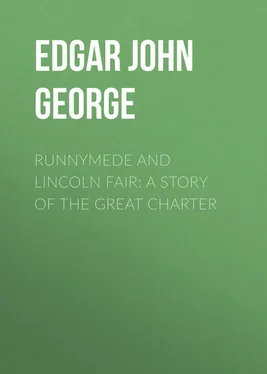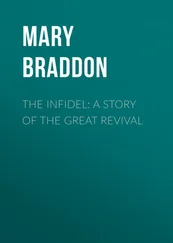John Edgar - Runnymede and Lincoln Fair - A Story of the Great Charter
Здесь есть возможность читать онлайн «John Edgar - Runnymede and Lincoln Fair - A Story of the Great Charter» — ознакомительный отрывок электронной книги совершенно бесплатно, а после прочтения отрывка купить полную версию. В некоторых случаях можно слушать аудио, скачать через торрент в формате fb2 и присутствует краткое содержание. Жанр: foreign_antique, foreign_prose, на английском языке. Описание произведения, (предисловие) а так же отзывы посетителей доступны на портале библиотеки ЛибКат.
- Название:Runnymede and Lincoln Fair: A Story of the Great Charter
- Автор:
- Жанр:
- Год:неизвестен
- ISBN:нет данных
- Рейтинг книги:3 / 5. Голосов: 1
-
Избранное:Добавить в избранное
- Отзывы:
-
Ваша оценка:
- 60
- 1
- 2
- 3
- 4
- 5
Runnymede and Lincoln Fair: A Story of the Great Charter: краткое содержание, описание и аннотация
Предлагаем к чтению аннотацию, описание, краткое содержание или предисловие (зависит от того, что написал сам автор книги «Runnymede and Lincoln Fair: A Story of the Great Charter»). Если вы не нашли необходимую информацию о книге — напишите в комментариях, мы постараемся отыскать её.
Runnymede and Lincoln Fair: A Story of the Great Charter — читать онлайн ознакомительный отрывок
Ниже представлен текст книги, разбитый по страницам. Система сохранения места последней прочитанной страницы, позволяет с удобством читать онлайн бесплатно книгу «Runnymede and Lincoln Fair: A Story of the Great Charter», без необходимости каждый раз заново искать на чём Вы остановились. Поставьте закладку, и сможете в любой момент перейти на страницу, на которой закончили чтение.
Интервал:
Закладка:
Years, however, had passed; great changes had taken place; and William de Collingham’s existence was almost forgotten even by John himself, when, on that spring day, the banished man rescued him from so terrible a danger. But the king was by no means sorry that Collingham was yet “in the flesh.” Indeed, his presence was most welcome, for John’s affairs had reached such a stage that every partisan was of consequence; and he did not think lightly of a follower so stout and so capable as Collingham of rendering loyal service, as his father had done before him. So Collingham exchanged his life in the forest for the king’s court; and having, in the first place, saved Oliver Icingla by a word, began to exercise much influence over the warlike preparations which John was making with the object of defending himself and his crown against attack.
And, indeed, it was now clear that the barons were ready to go all lengths. In vain the king had taken the cross; in vain he sent to Rome and invoked the mediation of the Pope. Nothing daunted them. On Easter week they gathered from various quarters in Lincolnshire, assembled at Stamford, and from Stamford removed to Brackley with two thousand knights, who, with squires and men-at-arms, made up a formidable feudal army. At Brackley they halted to deliberate before laying siege to Northampton, which is situated about fifteen miles from Brackley.
Naturally enough, John felt much alarm when he learned that his enemies were at the head of such a force as he could not cope with; but at this crisis he was not deserted. Not only the Nevilles, but the great Earls of Pembroke and Salisbury and Warren remained faithful in the day of adversity; and faithful also remained many chevaliers and gentlemen, who, without any personal liking for John, and without any of the young Icingla’s hereditary veneration for the memory of St. Edward, were yet determined to stand by the king and fight for the Confessor’s crown. However, it was necessary to take some steps to avert civil war if possible; and John, having summoned Archbishop Langton, sent him, in company with Pembroke and Warren, to hold a conference with the barons at Brackley, and offer to refer their dispute to arbitration. But they found the insurgents in no compromising mood. Producing the petition which, on the day of Epiphany, had been presented to the king in the house of the Templars, they recited the chief articles.
“These are our claims,” said the barons, sternly, as they handed the petition to Langton; “and, if we do not receive full satisfaction, we appeal to the God of Battles.”
The primate and the two earls returned to the king, and Langton, with the petition in his hand, explained its contents, and related what the barons had said.
“By God’s teeth!” exclaimed John, losing his temper, when calmness was so necessary, “I will not grant these men liberties which would make me their slave. Why do they not likewise demand my crown?”
Without delay Langton carried the king’s answer to Brackley; and the barons, fortified by the counsels and support of the primate, resolved to hesitate no longer. Calling themselves “the army of God and the Church,” they chose Robert Fitzwalter as their general-in-chief, and, raising the standard of revolt, advanced to Northampton in feudal array.
But Northampton did not, as they probably anticipated, open its gates to admit them. Defended by a strong castle, and walls built after the Conquest by Simon St. Litz, and strongly garrisoned with Royalists, the town held out gallantly, and for a whole fortnight defied all their assaults so successfully that they lost patience.
“We are wasting our strength here,” said some, “and giving the king time to take measures for our destruction.”
“Yes,” said others, “let us on to Bedford, to which William Beauchamp will admit us without a blow.”
Accordingly the barons raised the siege of Northampton, and marching to Bedford, of which William Beauchamp, one of their party, was governor, they took possession of the town. But John did not despair. A considerable body of mercenaries were now at his beck and call. William de Collingham was rallying archers to the royal standard; Pembroke, Warren, and Salisbury were mustering the fighting men of the districts subject to their sway; Lord Neville had hurried to his castle of Raby to summon the men of the North to the war. So long as London held out – and so far the Londoners seemed to look quietly on – there was still hope for the royal cause. Such was the state of affairs when an event occurred which changed the face of matters, and baffled all calculations.
It was Sunday, the 17th of May, 1215; and the king, having just heard morning mass, and summoned Oliver Icingla and other hostages, was informing them that their lives were forfeited by the rebellion of their kinsmen, and that they could only save themselves by taking an oath to serve him faithfully in the war, when William de Collingham presented himself, pale and agitated, but endeavouring to be calm.
“Sire, sire,” said he, “all is lost!”
“What mean you?” asked John, in a voice tremulous with emotion, and dismay on every feature.
“Simply this, sire,” answered William; “the Londoners have proved traitors, and Robert Fitzwalter and his army are now in possession of the city.”
John rose, tottered, reseated himself, tore his hair, and uttered some wild words, as if cursing the hour in which he was born.
“By God’s teeth!” cried he, stamping violently, “I have never prospered since the day I was reconciled to the Pope.”
But fury and regret could avail the king nothing. Every gate was already in the custody of the insurgents; and from the castles of Baynard and Montfichet waved the standard of revolt.
CHAPTER XI
ANCIENT LONDON
AT the opening of the thirteenth century, London, as I have already mentioned, was a little city, containing some forty thousand inhabitants, and surrounded by an old Roman wall, with seven double gates – the fortifications – being in parts much decayed. It was in the form of a bow and string, being much more extensive from east to west than from north to south, and narrower at both ends than at the middle; and the wall on the south side, along the bank of the Thames, was straight as a line, and fortified with towers, or bulwarks, in due distance from each other.
At that time London was considered one of the murkiest capitals in Europe. For the most part, the houses were mean, the lower stories built of plaster, and the upper, which were of timber, projecting over the lower; and, as has been observed, many of the streets were so narrow that the inhabitants, when they ascended to the roofs to breathe the fresh air, and look forth on the country, could converse with ease, and sometimes even shake hands.
Nevertheless, London was renowned for its wealth, and ever and anon the eye of a visitor was struck with some edifice rising with lofty dignity from among the dingy houses that lined the long narrow streets – the Tower Palatine, the Hospital of St. Katherine, the castles of Baynard and Montfichet, reared by Norman conquerors; the half-fortified mansions, inhabited by prelates and nobles when they were summoned to the king’s court; the residences of the richer citizens, who derived from their trade incomes that enabled them to rival the nobles in splendour; and the thirteen conventual, and the hundred and twenty-six parish churches, which studded the city, and kept alive the flames of learning and religion.
Moreover, within and without the walls, there were chapelries, and gardens, and places pleasant to the gazer’s eye. Orchards blossomed and apples grew where now are Paternoster Row and Ivy Lane, and to the north of Holborn, where, somewhat later, John de Kirkby built the palace for the Bishop of Ely; associated with the memory of John of Gaunt. Outside of Ludgate, and beyond the bridge that spanned the Fleet, and beyond the house of the Templars and Lincoln’s Inn, the town residence of the Lacies, was the Strand, overgrown with bushes and intersected with rivulets, having on one side the river, where barges floated and salmon leaped and swans glided; and on the other, gardens and fields, dotted with suburban villas, and stretching away in one direction to the chase and palace of Marylebone, and the hills of Highgate and Hampstead; and in another by Clerkenwell and Islington to the great forest of Middlesex, which was not, however, disforested till 1218, when the citizens had an opportunity of purchasing land and building houses and greatly extending the suburbs.
Читать дальшеИнтервал:
Закладка:
Похожие книги на «Runnymede and Lincoln Fair: A Story of the Great Charter»
Представляем Вашему вниманию похожие книги на «Runnymede and Lincoln Fair: A Story of the Great Charter» списком для выбора. Мы отобрали схожую по названию и смыслу литературу в надежде предоставить читателям больше вариантов отыскать новые, интересные, ещё непрочитанные произведения.
Обсуждение, отзывы о книге «Runnymede and Lincoln Fair: A Story of the Great Charter» и просто собственные мнения читателей. Оставьте ваши комментарии, напишите, что Вы думаете о произведении, его смысле или главных героях. Укажите что конкретно понравилось, а что нет, и почему Вы так считаете.












